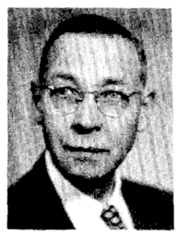- John B. Johnson
Infobox Scientist
box_width = 300px
name = Bert Johnson
image_size = 200px
caption = John Bertrand Johnson (1887–1970)
birth_date = birth date|1887|10|7
birth_place =Goteburg ,Sweden
death_date = death date and age|1970|11|27|1887|10|7
death_place =Orange, New Jersey ,USA
residence = flag|USA
citizenship = flag|USA|name=American
nationality =
ethnicity = flag|Sweden|name=Swedish
fields =Electronic engineer
workplaces =Bell Laboratories
alma_mater =Yale University
doctoral_advisor =
academic_advisors =
doctoral_students =
notable_students =
known_for =Johnson–Nyquist noise
author_abbrev_bot =
author_abbrev_zoo =
influences =
influenced =
awards =IEEE David Sarnoff Award (1970)
religion =Presbyterian
footnotes =John Bertrand "Bert" Johnson (1887–1970) ("né" Johan Erik Bertrand) was a Swedish-born American electrical engineer and physicist. [ [http://www.eleceng.adelaide.edu.au/Personal/dabbott/publications/EDU_abbott1996.pdf Johnson biography, p. 2] ] He first explained in detail a fundamental source of random interference with information traveling on wires.
In 1928, while at
Bell Telephone Laboratories he published thejournal paper "Thermal Agitation of Electricity in Conductors". Intelecommunication or other systems, "thermal noise " (or "Johnson noise") is thenoise generated by thermal agitation of electrons in a conductor. Johnson's papers showed a statistical fluctuation ofelectric charge occur in allelectrical conductor s, producing random variation ofpotential between the conductor ends (such as invacuum tube amplifier s andthermocouple s). Thermal noise power, perhertz , is equal throughout thefrequency spectrum . Bert Johnson deduced that thermal noise is intrinsic to all resistors and is not a sign of poor design or manufacture, although resistors may also have excess noise.Field-effect transistor
Bert Johnson was possibly among the first people to make a working
field effect transistor , based onJulius Edgar Lilienfeld 's US Patent 1,900,018 of 1928. In sworn testimony to the U.S. patent office in 1949, Johnson reported "...although the modulation index of 11 per cent is not great,...the useful output power is substantial...it is in principle operative as an amplifier". [Robert G. Arns, "The other transistor: early history of the metal-oxide-semiconductor field-effect transistor," "Engineering Science and Education Journal," October 1998] On the other hand, in an article in 1964 he denied the operability of Lilienfeld's patent, saying "I tried conscientiously to reproduce Lilienfeld’s structure according to his specification and could observe no amplification or even modulation." [J. B. Johnson, "More on the solid-state amplifier and Dr. Lilienfeld," "Physics Today", May 1964]References
ee also
*
Johnson–Nyquist noise
*Timeline of thermodynamics, statistical mechanics, and random processes External articles and references
* J. B. Johnson, " [http://dx.doi.org/10.1103/PhysRev.32.97 Thermal Agitation of Electricity in Conductors] ". The American Physical Society, 1928.
*Federal Standard 1037C andMIL-STD-188
Wikimedia Foundation. 2010.
